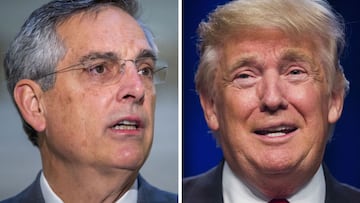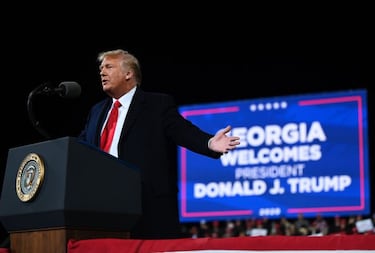Donald Trump sues Georgia over call recording: what has he argued?
Following the publication of the leaked call by The Washigton Post, in which Trump pressed Georgia's SoS Brad Raffensperger to 'find votes', more action is said to be coming.


After the audio of a conference call was leaked to the press, in which lame-duck President Donald Trump pressured Georgia Secretary of State Brad Raffensperger to ‘find votes’ to help him overturn Joe Biden’s victory, it is being reported that the desperate Republican is now looking to sue.
Trump lawsuit pending on Georgia leaked call
The call that lasted approximately an hour - you can listen and read the full transcript here - had various legal representatives from both sides included, as well as Chief of Staff Mark Meadows.
- Trump leaked phone call: what have Democrats said?
- Trump begs Georgia official to “recalculate” election result in leaked phonecall audio
- All you need to know about Georgia Senate runoffs
- What will Republican senators do to stop the electoral vote count?
The audio, which was initially published by The Washington Post, shows attempts from Trump to persuade Raffensperger of the merits of his unfounded claims through circular ramblings of arguments that have already been dismissed by the courts. A continued reference to 'just needing to find 11,780 votes' (Biden’s winning margin), rather than the 'hundreds of thousands' of votes that Trump says he definitely won by, was notable. Although a few times he misspoke that figure throughout the call.
The Georgian official remained quiet and listened calmly to much of it, only interjecting, along with his lawyer, to advise that the data that Trump’s team were quoting was incorrect. In one very specific rebuttal, when the 5,000 'dead voters' allegation was said to have been investigated and the actual number found was only two, the president was quick to move on, rather than discuss further.
As Trump grew more and more frustrated, his language changed to a more aggressive style, with what appeared to be clear threats over Raffensperger and his lawyer committing criminal offences in this, and stating that their efforts to get what they wanted would not just go away.
President @realDonaldTrump has filed two lawsuits - federal and state - against @GaSecofState. The telephone conference call @GaSecofState secretly recorded was a “confidential settlement discussion” of that litigation, which is still pending.
— David Shafer (@DavidShafer) January 3, 2021
Although we are still unclear of how the recording got to The Post, Republican Party chair David Shafer took to Twitter to announce that Trump had “filed two lawsuits - federal and state - against @GaSecofState."
"The telephone conference call @GaSecofState secretly recorded was a ‘confidential settlement discussion’ of that litigation, which is still pending,” he continued.
It is worth noting, however, that both Georgia and Washington DC, where the two ends of the call were connected, have one-party consent laws. This means that consent from the other party involved is not required for recording.
Shafer claims, though, that the audio “omits the stipulation that all discussions were for the purpose of settling litigation and confidential under federal and state law.”
President Trump could have violated election interference laws in his call to Georgia officials, but lawyers said it would be hard to pursue charges. https://t.co/71yYixfX9y
— The New York Times (@nytimes) January 4, 2021
Trump campaign previously filed Georgia election lawsuit
Back in December Trump’s campaign filed a lawsuit in Georgia state court seeking to invalidate the presidential election results there, one of a series of legal challenges aimed at reversing his loss that have gone nowhere.
The Trump campaign said in a statement its new lawsuit would include sworn statements from Georgia residents alleging fraud.
Georgia’s Secretary of State Brad Raffensperger, a Republican, like Trump, and other state officials have said repeatedly they have found no evidence of widespread fraud in the 3 November election won by Democrat Joe Biden.
Trump’s team and various individuals backing him have suffered a string of legal defeats around the country, including in cases filed in Nevada and Wisconsin that sought court orders to reverse those states’ election results. President-elect Biden won the election with 306 Electoral College votes - against the 270 required - to Trump’s 232.

A district judge in Nevada dismissed a case brought by would-be Republican presidential electors and said they must pay defendants’ legal costs after failing “to meet their burden to provide credible and relevant evidence to substantiate” any of the lawsuit’s claims.
The Wisconsin Supreme Court in a 4-3 decision declined to act on a case that sought to have the court nullify the presidential election in the state and pave the way for the state legislature to choose Wisconsin’s 10 presidential electors. “Such a move would appear to be unprecedented in American history,” Wisconsin Supreme Court Justice Brian Hagedorn wrote in his concurring opinion of four justices.
Trump raising millions via small print
Related stories
Trump’s campaign is said to have spent well over ten million dollars on its unsuccessful bid to overturn the results of the election, including nearly $2.3 million to lawyers and consultants.
The campaign and the Republican National Committee have raised at least $207.5 million since Election Day, much of it from solicitations asking for donations to an “Official Election Defense Fund”. The fine print made clear most of the money would go to other priorities through Trump’s new political action committee, which could fuel his future political endeavors.

